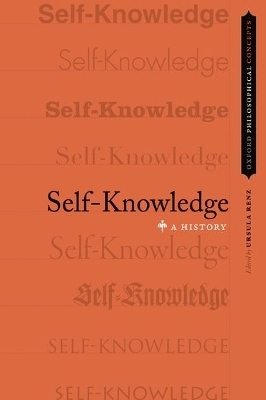
Self-Knowledge
Oxford University Press Inc (Verlag)
978-0-19-022642-8 (ISBN)
The acquisition of self-knowledge is often described as one of the main goals of philosophical inquiry. At the same time, some sort of self-knowledge is often regarded as a necessary condition of our being a human agent or human subject. Thus self-knowledge is taken to constitute both the beginning and the end of humans' search for wisdom, and as such it is intricately bound up with the very idea of philosophy. Not surprisingly therefore, the Delphic injunction 'Know thyself' has fascinated philosophers of different times, backgrounds, and tempers.
But how can we make sense of this imperative? What is self-knowledge and how is it achieved? What are the structural features that distinguish self-knowledge from other types of knowledge? What role do external, second- and third-personal, sources of knowledge play in the acquisition of self-knowledge? How can we account for the moral impact ascribed to self-knowledge? Is it just a form of anthropological knowledge that allows agents to act in accordance with their aims? Or, does self-knowledge ultimately ennoble the self of the subjects having it? Finally, is self-knowledge, or its completion, a goal that may be reached at all?
The book addresses these questions in fifteen chapters covering approaches of many philosophers from Plato and Aristotle to Edmund Husserl or Elisabeth Anscombe. The short reflections inserted between the chapters show that the search for self-knowledge is an important theme in literature, poetry, painting and self-portraiture from Homer.
Ursula Renz is Professor of Philosophy at the University of Klagenfurt, Austria. She has widely published about early modern philosophy, Neo-Kantianism and the history of philosophy mind. Her book Die Erklärbarkeit der Erfahrung. Realismus und Subjektivität in Spinozas Theorie des menschlichen Geistes (2010), was awarded with the Journal of the History of Philosophy Book Prize in 2011, and will be translated in English by Oxford University Press.
Reflection I: Does Homer's Odysseus know himself? Tobias Myers
1. Self-Knowledge in Plato Rachana Kamtekar
2. Aristotle´s Requisite of Self-Knowledge Christopher Shields
3. Self-Knowledge in Later Stoicism Marcel van Ackeren
4. Self-Knowledge in Plotinus: Becoming Who You Are Pauliina Remes
5. Augustine on Self-Knowledge and Human Subjectivity Johannes Brachtendorf
6. Self-Knowledge in Scholasticism Dominik Perler
7. Self-Knowledge, Abnegation, and Fulfillment in Medieval Mysticism Christina van Dyke
8. Socratic Self-Knowledge in Early Modern Philosophy Ursula Renz
9. Self-Knowledge and Self-Deception in Modern Moral Philosophy Aaron Garrett
10. Kant´s Ideal of Self-Knowledge Dina Emundts
Reflection II: Shelley and the Limit of Self-Knowlege Laura Quinney
11. Self-Knowledge in Kierkegaard John Lippitt
12. Self-Knowledge as Freedom in Schopenhauer and Freud Bernard Reginster
13. Husserl´s Phenomenology and the Project of Transcendental Self-Knowledge Dermot Moran
Reflection III: Romare Bearden and a Collage of Self-Knowledge Yasmine Espert
14. Self-Knowledge in Hermeneutic Philosophy Charles Guignon
15. The First Person and Self-Knowledge in Analytic Philosophy Sebastian Rödl
Reflection IV: Self-Knowledge and Self-Portraiture Christopher Wood
| Erscheinungsdatum | 29.11.2016 |
|---|---|
| Reihe/Serie | Oxford Philosophical Concepts |
| Verlagsort | New York |
| Sprache | englisch |
| Maße | 140 x 208 mm |
| Gewicht | 408 g |
| Themenwelt | Geisteswissenschaften ► Geschichte |
| Geisteswissenschaften ► Philosophie ► Erkenntnistheorie / Wissenschaftstheorie | |
| Geisteswissenschaften ► Philosophie ► Geschichte der Philosophie | |
| Geisteswissenschaften ► Philosophie ► Philosophie Altertum / Antike | |
| Geisteswissenschaften ► Philosophie ► Philosophie der Neuzeit | |
| ISBN-10 | 0-19-022642-0 / 0190226420 |
| ISBN-13 | 978-0-19-022642-8 / 9780190226428 |
| Zustand | Neuware |
| Informationen gemäß Produktsicherheitsverordnung (GPSR) | |
| Haben Sie eine Frage zum Produkt? |
aus dem Bereich

![Was heißt Denken?. Vorlesung Wintersemester 1951/52. [Was bedeutet das alles?] - Martin Heidegger](/media/113619842)
